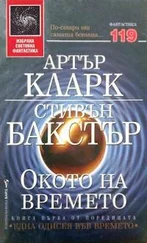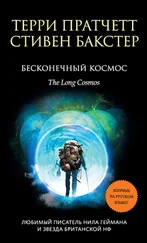Kate said, 'Malenfant's essentially right, isn't he? On some level you anticipated all this.' 'How can you know that?' 'I saw you smile. At JPL.'
Cornelius nodded. 'You see? Simple observation, Malenfant. This girl really is brighter than you are.' 'Get to the point, Cornelius.'
Cornelius sighed, a touch theatrically. 'You know, the facts are there, staring everybody in the face. The logic is there. It's just that most people are unwilling to think it through.
'Take seriously for one minute the possibility that we are living in a planetarium, some kind of virtual-reality projection. What must it cost our invisible controllers to run? We are an inquisitive species, Malenfant. At any moment we are liable to test anything and everything to destruction. To maintain their illusion, the controllers would surely require that their simulation of every object should be perfect - that is, undistinguishable from the real thing by any conceivable physical test.'
'No copy is perfect,' Malenfant said briskly. 'Quantum physics. Uncertainty. All that stuff.'
'In fact your intuition is wrong,' Cornelius said. 'Quantum considerations actually show that a perfect simulation is possible
- but it is energy-hungry.
'You see, there is a limit to the amount of information which may be contained within a given volume. This limit is called the Bekenstein Bound.' Equations scrolled across the table surface before Kate; she let them glide past her eyes. 'The Bound is essentially a manifestation of the Heisenberg Uncertainty Principle, a reflection of the fundamental "graininess" of our reality. Because of the existence of the Bound, every physical object is a finite state machine - that is, it only requires a finite number of bits to replicate its every possible condition. Therefore a perfect simulation of any physical object can be made - perfect, meaning undistinguishable from the real thing by any conceivable physical test.'
Kate said uneasily, 'Anything can be replicated?'
Cornelius smiled. 'Including you, Kate. But perfect simulations
are expensive. The bigger they are, the more energy they burn. And that is the chink in the controllers' armour.' 'It is?'
'As human civilization has progressed, successively larger portions of reality have come within our reach. And the extent of the universe which must be simulated to high quality likewise increases: the walls around reality must be drawn successively back. Before 1969, for example, a crude mock-up of the Moon satisfying only a remote visual inspection might have sufficed; but since 1969, we can be sure that the painted Moon had to be replaced with a rocky equivalent. You see?' He winked at Kate. 'A conspiracy theorist might point to the very different quality of the Moon's far side to its Earth-visible near side - mocked up in a hurry, perhaps?'
'Oh, bullshit, Cornelius,' Malenfant said tiredly.
Kate said, 'You actually have numbers for all this?'
Malenfant grunted. 'Numbers, yeah. The mathematics of paranoia.'
Cornelius, unperturbed, tapped at his desktop surface, and a succession of images, maps with overlays and graphs, flickered over its surface. 'We can estimate the resources required to run a perfect planetarium of any given size. It's just a question of quantum mechanics and thermodynamics.' He flicked a smile. 'Graduate physics. Two equations.
'Look here. For much of its pre-agricultural history humanity consisted of small roaming bands with little knowledge, save for tentative trading links, beyond a disc on the Earth's surface with radius of a few kilometres. To generate planetariums on such a scale would require no more than a few per cent of the energy available to a planetary-scale civilization: we could probably do it.
'But by the time you have to fool a cohesive culture covering a hundred kilometres - that's a lot smaller than the Roman Empire, say - the capabilities of that planetary-level civilization would be exceeded.
'The bigger the planetarium, the harder it gets. We can characterize our modern globe-spanning civilization by the radius of Earth and a depth corresponding to our deepest mines. To generate a planetarium on such a scale would exceed even the capability of a civilization able to master the energy output of a single star.
'A future human culture capable of direct exploration of the centre of the Earth, and able to reach comets twice as far away as Pluto, would exhaust the resources of a galaxy.
'And if we reach the stars, we would test the resources of any conceivable planetarium…'
Kate was bewildered by the escalation of number and concept. 'We would?'
'Imagine a human colonization disc of radius a hundred light years, embedded in the greater disc of the Galaxy. To simulate every scrap of mass in there would exceed in energy requirements the resources of the entire visible universe. So after that point, any simulation must be less than perfect - and its existence prone to our detection. The lies must end, sooner or later. But, of course, we might not have to wait that long.'
'Wait for what?'
'To crash the computer.' He grinned, cold; on some level, she saw, this was all a game to him, the whole universe as an intellectual puzzle. 'Perhaps we can overstretch their capacity to assemble increasing resources. Rushing the fence might be the way: we could send human explorers out to far distances in all directions as rapidly as possible, pushing back the walls around an expanding shell of space. But advanced robot spacecraft, equipped with powerful sensors, might achieve the same result…'
'Ah,' said Kate. 'Or maybe even active but ground-based measures. Like laser echoing. And that's why you pushed Project Michelangelo.'
Malenfant leaned forward. 'Cornelius - what have you done}' Cornelius bowed his head. 'By the logic of Fermi, I was led to the conclusion that our universe is, in whole or in part, a thing of painted walls and duck blinds. I wanted to challenge those who hide from us. The laser pulse to Centauri - a sudden scale expansion of direct contact by a factor of thousands - was the most dramatic way I could think of to drive the controllers' processing costs through the roof. And it must have caught them by surprise - our technology is barely able enough to handle such a feat -those critics were right, Malenfant, when they criticized the project for being premature. But they did not see my true purpose.'
Kate said slowly, 'I can't believe your arrogance. What gave you the right -'
'To bring the sky crashing down?' His nostrils flared. 'What gave them the right to put us in a playpen in the first place? If
we are being contained and deceived, we are in a relationship of unequals. If our controllers exist, let them show themselves and justify their actions. That was my purpose - to force them out into the open. And imagine what we might see! The fire-folk sitting in the air! I The bright boroughs, the circle-citadels there! ... Do you know Gerard Manley Hopkins?'
Malenfant shook his head. 'You were right, Kate. The guy is crazy.'
Cornelius studied them both. 'To practical matters. When the anomalies are visible to all, disorder among the foolish herds will follow. Soon flights will be grounded, the freeways jammed. If you wish to leave -'
Malenfant touched Kate's hand. 'Where is home for you?'
She shrugged. 'I have an apartment in LA. I don't even know where my parents are. Either of them.'
'It's not a time to be alone. Go be with your mom.'
'No.' She was shuddering. Her involvement in all this had long passed that of a journalist attached to a story; now she was just another human being, staring bewildered at the approaching hurricane - but here she was at the eye of the storm, and something about Malenfant's strength reassured her. 'Let me stay. Please.'
He nodded brusquely, avoiding her eyes. 'Cornelius, if you have nowhere else to go -'
Читать дальше
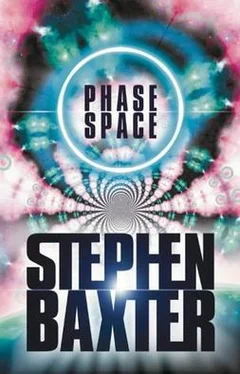
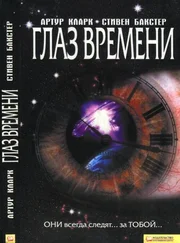


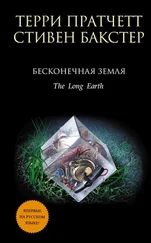




![Стивен Бакстер - Бесконечный Космос [litres]](/books/415680/stiven-bakster-beskonechnyj-kosmos-litres-thumb.webp)
